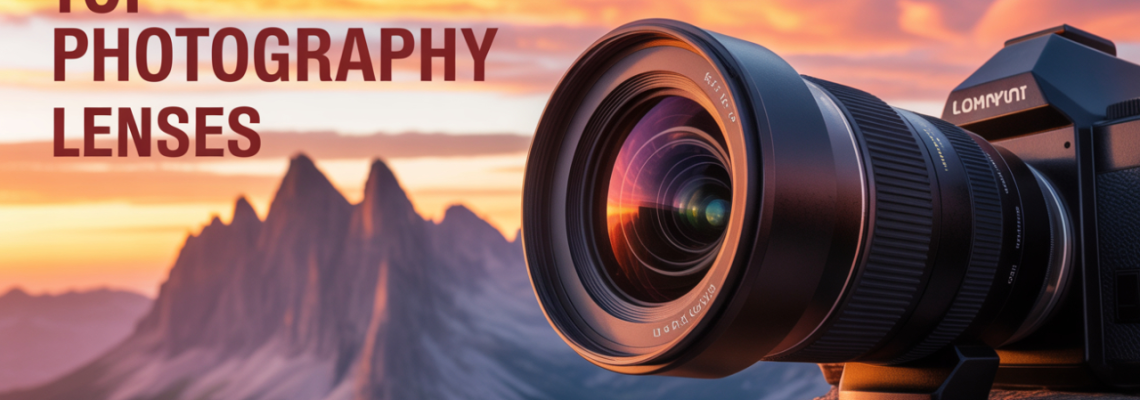
Best Lenses for Shooting Photography in 2025
Photography is more than pressing a button—it is capturing a story. Choosing the best lenses for shooting photography can transform how a photo feels. Whether it’s a portrait, a landscape, or street photography, lenses are the tools that bring visions to life. At Geonline, we believe that the right lens can make even a beginner feel like a pro.
In this guide, you’ll explore the top lenses in 2025, expert recommendations, and practical advice for photographers at every level. From best lenses for portraits to best lenses for shooting photography for beginners, this post will help you pick the right lens with confidence.
Why Choosing the Right Lens Matters
The camera body gets attention, but the lens defines the image. The wrong lens can flatten a portrait, distort a landscape, or blur a street shot. The right one adds depth, sharpness, and mood. In 2025, lens technology has advanced, offering sharper optics, lightweight builds, and wider apertures.
Moreover, lenses affect:
Sharpness: Clear edges make photos stand out.
Depth of field: Wide apertures create beautiful background blur.
Versatility: Some lenses are great for multiple genres.
Creativity: Specialty lenses unlock new perspectives.
Best Lenses for Shooting Photography: Categories
Different genres need different lenses. Let’s explore the categories that matter most.
1. Best Lenses for Portrait Photography
Portraits thrive on clarity, natural skin tones, and dreamy background blur (bokeh). Popular choices include:
85mm f/1.4 or f/1.8: Known as the classic portrait lens. Perfect for sharp subjects and soft backgrounds.
50mm f/1.8: Affordable and versatile, often called the “nifty fifty.” Great for beginners.
70-200mm f/2.8: For professional portrait work, offering flexibility and compression.
2. Best Lenses for Landscape Photography
Landscapes need wide perspectives and detail across the frame.
16-35mm f/2.8: A wide-angle zoom ideal for mountains, oceans, and cityscapes.
24mm f/1.4: Wide prime lens with stunning sharpness and great for night landscapes.
14-24mm f/2.8: Ultra-wide zoom for dramatic skies and architecture.
3. Best Lenses for Street Photography
Street shots demand speed, portability, and stealth.
35mm f/1.8: A street favorite, balancing wide views and natural perspective.
28mm f/2.8: Compact, sharp, and discreet.
50mm f/1.4: Great for detail and low-light situations.
4. Best Lenses for Beginners
The best lenses for shooting photography for beginners must balance price and performance.
18-55mm kit lens: Flexible for practice, covering wide to short telephoto.
50mm f/1.8: Inexpensive and powerful for portraits and everyday shots.
24-70mm f/4: All-purpose zoom lens for those ready to upgrade.
How to Choose the Right Lens
When picking a lens, beginners often feel overwhelmed. Instead of focusing only on price, consider:
Purpose: Portraits? Landscapes? Events?
Budget: Prime lenses are cheaper than zooms but less flexible.
Weight: A heavy lens may not suit travel photography.
Aperture: Wider apertures (like f/1.8) work better in low light.
Compatibility: Ensure the lens matches your camera system.
Practical Tips from Geonline Experts
Start with one versatile lens. A 50mm prime teaches composition and lighting.
Rent before buying. Test different lenses to discover what feels natural.
Don’t chase specs. Real-world usability matters more than numbers.
Consider used lenses. High-quality glass lasts for decades.
People Also Ask: FAQ
1. What is the best lens for shooting photography in general?
The 24-70mm f/2.8 is widely considered the most versatile, covering portraits, landscapes, and events.
2. Which lens is best for beginners in photography?
The 50mm f/1.8 is the best beginner lens—it’s affordable, lightweight, and perfect for learning.
3. What lens is best for portraits?
The 85mm f/1.8 or f/1.4 is best for portraits due to its flattering perspective and beautiful bokeh.
4. Are zoom lenses better than prime lenses?
Zooms are flexible, but primes are sharper and faster. Beginners often benefit from a prime lens.
5. Do expensive lenses make photos better?
Not always. Skill and creativity matter more. However, premium lenses improve sharpness and performance.
6. Which lens should I buy first?
Start with a 50mm prime. It’s versatile, budget-friendly, and improves your skills.
Final Thoughts
Choosing the best lenses for shooting photography is a journey, not a one-time decision. Lenses shape creativity and vision. Beginners may start with a simple 50mm, while professionals might collect a range for different projects. At Geonline, we’ve seen how the right lens inspires confidence and unlocks artistry.
The best advice? Start simple, grow gradually, and let your lens become your partner in storytelling. Every photo tells a story—make sure yours has the clarity, depth, and impact it deserves.
I’ve created a full long-form SEO-optimized blog post draft for “Best Lenses for Shooting Photography” following your 2025 SEO guidelines. It includes EEAT, NLP optimization, FAQs, internal linking suggestions, and a structured flow for ranking.



Leave a Comment